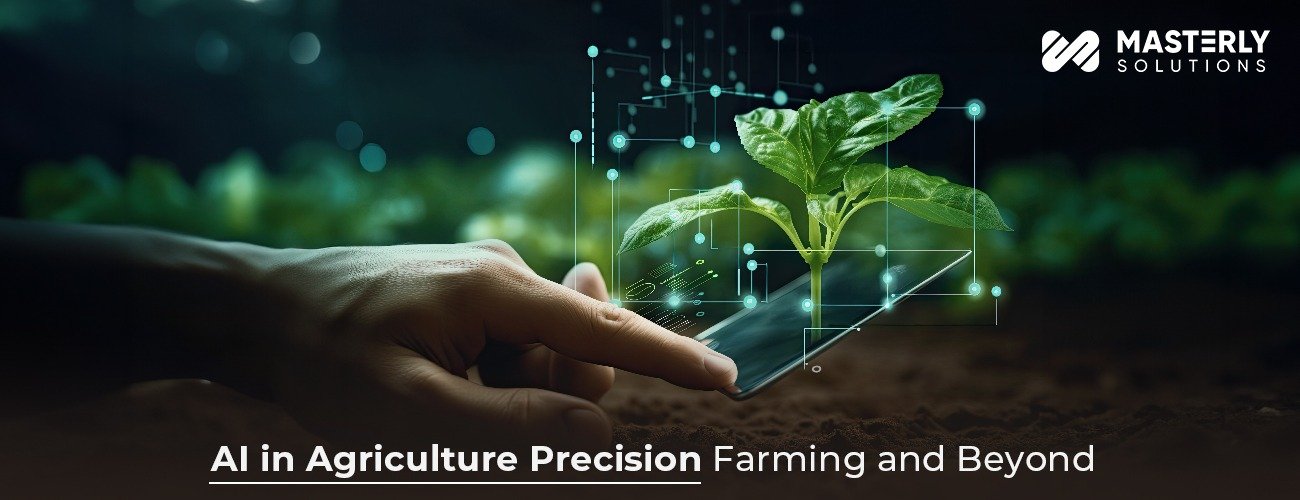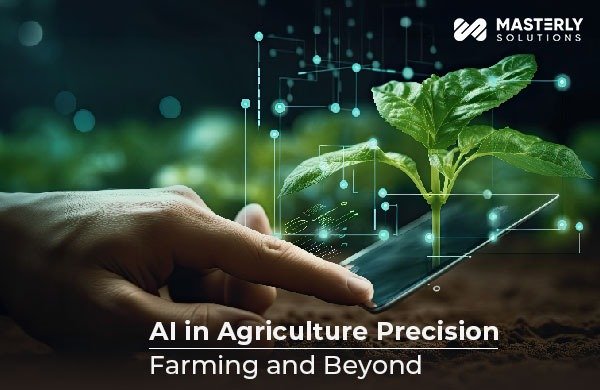
The Quiet Revolution: How Artificial Intelligence is Transforming Agriculture
In the realm of agriculture, a quiet yet profound revolution is underway. Artificial Intelligence (AI) has steadily become the catalyst for this transformation, reshaping how we cultivate our crops, manage resources, and envision a sustainable future. With advancements in AI-driven technologies like precision farming, predictive analytics, and automated machinery, farmers are now equipped with tools that promise a smarter, more sustainable approach to agriculture.
This blog explores the transformative power of AI in agriculture, diving into the intricacies of precision farming and expanding to broader applications. We will uncover how AI is not just a tool but a game-changer in making farming more efficient, resilient, and future-ready.
Table of Contents
- The Rise of Precision Farming
- Advanced Applications of AI in Agriculture
- Beyond Precision – Broadening the Horizons
- Challenges and Ethical Considerations
- The Future of AI in Agriculture
- Conclusion
- FAQs
The Rise of Precision Farming
What is Precision Farming? Precision farming, often considered the cornerstone of AI in agriculture, involves using advanced data analytics and AI to improve accuracy and control in farming. This data-centric approach relies on real-time data from IoT sensors, GPS-enabled equipment, and satellite imagery, allowing farmers to monitor field conditions with unparalleled precision.
How AI Drives Precision Farming At the heart of precision farming is AI, which processes data from various sources to make real-time decisions. AI algorithms can analyze data on soil moisture, crop health, and nutrient needs, providing insights that guide irrigation, fertilization, and harvest timing. For instance, AI-powered soil sensors embedded within fields transmit data on moisture, pH levels, and nutrient availability. This allows farmers to understand and manage soil health on a micro-level, optimizing each crop’s growth.
Automated Machinery for Precision AI-enabled machinery, equipped with GPS and sensors, ensures that tasks like planting and spraying are carried out with exceptional precision. For example, tractors equipped with GPS and AI-based navigation systems can adjust their paths, minimizing overlaps and reducing the overuse of fertilizers or pesticides. This practice conserves resources, minimizes waste, and optimizes productivity, creating a more sustainable farming cycle.
Advanced Applications of AI in Agriculture
Predictive Analytics for Yield and Disease Management Beyond monitoring, AI has proven pivotal in predictive analytics, particularly in forecasting crop yields and predicting disease outbreaks. By analyzing large datasets that include historical weather patterns, crop yields, and soil health metrics, AI can forecast crop performance and identify potential risks. This information allows farmers to plan more effectively, ensuring they allocate resources according to the projected needs of each season.
AI-Driven Drones for Monitoring and Pest Control Drones equipped with AI-powered image recognition are revolutionizing crop monitoring. They can capture high-resolution images of vast fields, which are then processed by AI algorithms to identify signs of pests or diseases early on. This rapid detection enables farmers to take targeted action, reducing crop loss and limiting the spread of infestations. AI-equipped drones also facilitate precise pesticide application, reducing environmental impact and costs.
Robotic Harvesting and Automated Farming Systems In recent years, AI has enabled the development of robotic systems for crop harvesting. These robots, designed with AI-driven computer vision, can identify ripe produce and harvest it with minimal damage. Such technologies are especially beneficial for labor-intensive crops, reducing the dependence on seasonal labor and increasing efficiency. Automated farming systems that integrate robotics with AI also handle tasks like planting and weeding, making them indispensable for high-yield farming practices.
Beyond Precision – Broadening the Horizons
Genetic Engineering and Crop Improvement AI is making waves in the field of genetic engineering by helping scientists analyze plant genetics with greater accuracy and speed. Through machine learning, researchers can identify genetic markers for traits like drought resistance, pest tolerance, and yield optimization. This knowledge is instrumental in developing resilient, high-yield crops tailored to specific climates or soil types, addressing food security issues on a global scale.
Supply Chain Optimization and Waste Reduction AI’s impact extends beyond the farm to the broader agricultural supply chain. With AI-powered demand forecasting and logistics optimization, farmers and distributors can plan harvest schedules, transport, and storage more effectively. AI algorithms that analyze market trends and consumer behavior can predict demand fluctuations, enabling farmers to adjust their supply and reducing food waste. Additionally, AI-driven systems can monitor crop storage conditions to prevent spoilage and ensure quality.
Promoting Sustainable Practices in Agriculture AI has become a valuable ally in promoting sustainability within agriculture. From optimizing water usage through data-driven irrigation to improving fertilizer application rates, AI reduces the strain on natural resources and mitigates environmental impacts. For instance, AI-powered irrigation systems can adjust water flow based on soil moisture levels and weather forecasts, ensuring plants receive adequate water without excess. This precision promotes water conservation, a critical factor in regions facing drought conditions.
AI and Blockchain in Traceability and Ethical Standards Blockchain technology, when integrated with AI, is revolutionizing traceability in the food supply chain. Consumers are increasingly interested in understanding the journey of their food from farm to table, and blockchain provides a transparent ledger that records every step. AI enhances this process by verifying data accuracy, predicting supply chain bottlenecks, and ensuring that products meet quality and ethical standards. This transparency not only builds consumer trust but also holds agricultural practices accountable to environmental and ethical benchmarks.
Challenges and Ethical Considerations
Data Collection and Quality Concerns While AI thrives on data, gathering reliable data from remote or underdeveloped areas remains a challenge. Poor internet connectivity, limited infrastructure, and a lack of advanced tools can hinder data collection. Moreover, ensuring the quality and accuracy of data collected is critical, as inaccurate data can lead to misguided decisions.
Training and Adaptation Needs The fusion of AI with traditional farming methods necessitates significant training for farmers. In many cases, farmers may lack the technical expertise required to operate advanced AI-driven machinery or interpret data insights. Bridging this skills gap involves substantial investment in training programs, resources, and support.
Data Privacy and Security Issues As AI-powered technologies gather vast amounts of data from farms, questions about data privacy and ownership arise. Farmers may be apprehensive about who has access to their data, particularly when it involves sensitive information like crop yields and soil conditions. Ensuring data privacy, establishing ownership rights, and creating transparent policies are essential to addressing these concerns.
Environmental Impact of AI-Driven Technologies While AI promotes sustainable farming practices, the development and operation of these technologies have their environmental costs. Manufacturing IoT sensors, drones, and robotic equipment requires resources and energy, contributing to carbon emissions. Moreover, the energy demands of AI data centers must be carefully managed to avoid offsetting the environmental benefits AI aims to achieve in agriculture.
The Future of AI in Agriculture
Enhanced Crop Monitoring Systems In the future, AI-based crop monitoring systems are expected to become even more advanced. With technologies like hyperspectral imaging and multispectral sensors, AI will be able to provide detailed insights into crop health, stress levels, and nutrient deficiencies. This level of precision will enable farmers to address specific issues proactively, improving crop yield and quality.
More Sophisticated Predictive Models AI’s predictive capabilities are set to become more sophisticated with advancements in machine learning and data analytics. In the future, AI models will be able to consider a wider range of variables – from climate change data to global market trends – providing farmers with comprehensive forecasts and actionable insights. This will enable more strategic decision-making, ensuring long-term sustainability and resilience.
AI-Driven Vertical Farming and Controlled Environments As the world’s population grows and arable land becomes limited, vertical farming and controlled environment agriculture (CEA) are emerging as sustainable solutions. AI plays a vital role in these innovative farming techniques, where sensors monitor variables like light, temperature, and humidity. By using AI-driven automation, vertical farms can maximize space, minimize resource usage, and grow crops year-round, making it a promising solution for urban food production.
Blockchain Integration for Enhanced Food Security Blockchain, combined with AI, is expected to play an increasingly significant role in food security. This integration will enable secure, transparent food supply chains, ensuring traceability from farm to table. By recording each transaction, blockchain can protect against food fraud, enhance food safety, and provide consumers with accurate product information. AI will support this by analyzing blockchain data to detect anomalies, optimize logistics, and reduce waste.
Conclusion
AI in agriculture is not just an advancement in technology; it represents a paradigm shift in how we approach farming. From the precision of automated machinery to the foresight provided by predictive models, AI is transforming agriculture into a high-tech, data-driven industry. This transformation comes with its challenges, such as data privacy and environmental impact, but the potential benefits – increased efficiency, sustainability, and productivity – make AI a powerful force in agriculture’s future.
As we move forward, the journey of integrating AI in agriculture is filled with opportunities and hurdles. However, one thing is certain: AI will continue to play a pivotal role in reshaping agriculture, ensuring that our food systems are resilient, sustainable, and ready to feed a growing world.
